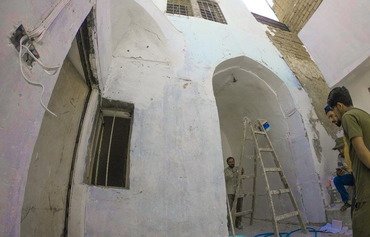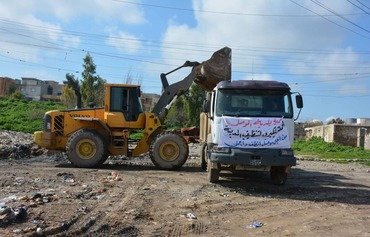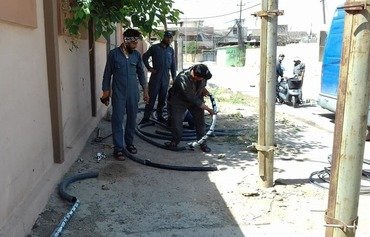As soon as the Iraqi army and federal police moved into the area around Mosul, the Iraqi government directed its local service departments to resume the provision of services and secure infrastructure in the liberated areas.
In a November 11th meeting with Ninawa provincial council members, Prime Minister Haider al-Abadi called on all service department managers and employees in the province to resume working within the liberated areas.
The provision of public services will enhance the security gains of the Iraqi army, help it move forward with more momentum, and reduce the displacement of residents to overcrowded camps, he said.
The Ninawa municipal department was one of the first service departments to begin work in the liberated areas in Ninawa Plain and areas south of Mosul, department director Abdul Qader Hassan told Diyaruna.
Despite facing a lack of financial resources, he said, the municipality, with support from the Ministries of Construction and Municipalities and international organisations, has begun to remove explosive remnants of war, debris and waste from many of the liberated areas.
Cadres from the municipality managed, in record time, to clean the liberated areas south of Mosul, he said, specifically in al-Qayyarah and Hamam al-Alil .
They are facing a bigger challenge, however, in the northern sector of Ninawa Plain in Bashiqa, Bartella and Hamdaniya, which have been completely depopulated and need redoubled efforts to encourage families to return.
Additional challenges
In addition to the removal of explosives and debris, challenges of another kind face municipal and service departments in their work in the liberated areas, Mayor of Mosul Hussein Ali Hajim told Diyaruna.
"Today we are faced with the challenge of mass graves of ISIL victims ," he said.
These include a mass grave found in the College of Agriculture in Hamam al-Alil which includes more than 150 headless and unidentified bodies, he said.
Service departments are not able to remove these bodies until the arrival of specialised staff who will begin the task of identifying and analyzing the bodies before they are removed for proper burial.
"Many families of people missing from Hamam al-Alil, al-Shura and al-Qayyarah are suffering as they fear the bodies may belong to their relatives who were kidnapped by ISIL," he said.
Weeks ago, he said, the group's fighters led dozens of families to unknown places and are thought to have executed some of them in Hamam al-Alil and other locations.
Post-liberation planning
Mosul will be divided into eight service sectors after its liberation, Hajim said, with four on the right bank of the Tigris and four on the left.
Each section will be treated as an independent administrative unit titled as a region, he added.
The left bank will be managed by the first deputy to the governor and the right bank by the second deputy, he said, who will be supported by an integrated staff of aides in addition to the managers of government departments in the province.
Cadres on both sides of the city will work under the direct supervision of Ninawa province governor Nofal Hammadi, who will report to Ali al-Allaq in the Prime Minister's office for crisis management.
Each group in the eight sectors will inventory the damage caused during the battles and will submit recommendations and requirements to the higher authorities to restore stability and provide services in those areas, he said.
The UN Development Programme also has drawn up plans to provide water, electricity and health services to Mosul residents after the liberation, governor Hammadi told Diyaruna.
"The UNDP has allocated $13 million to support the local government in providing services for the city," he said, adding that ISIL has intentionally destroyed the infrastructure and service facilities in many of the sites it fled.

![Work vehicles put out fires and clean up areas ahead of the restoration of services in liberated parts of Ninawa province. [Photo courtesy of Ninawa mayor Nofal Hammadi]](/cnmi_di/images/2016/11/29/6658-iraq-ninawa-trucks-600_384.jpg)






